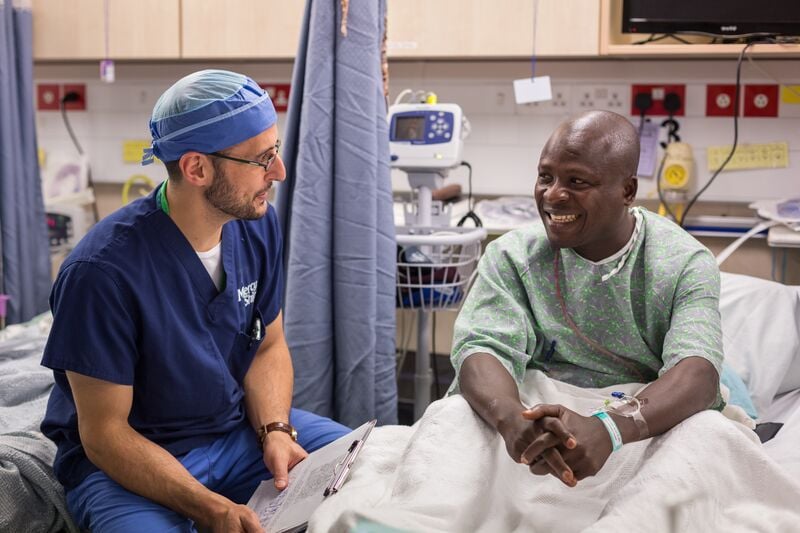“Why did I decide to start a career in medicine?” Dr. Mark Shrime began matter-of-factly. “Because I am the firstborn son of an immigrant family. I had three options: doctor, lawyer, or failure. That is the honest truth, that I went into medicine because I felt it was a respectable career.”
Dr. Shrime had direction, he had drive, he was moving ahead at a good speed in his career. What he did not have was fuel. He was running on fumes, towards a destination he wasn’t sure would be worth the journey. Amid his doubts, a classmate invited him to visit Mercy Ships. It took a lot of convincing, but he finally accepted — a decision that changed the motivation for his entire life.
“When I actually got down to the hospital deck on the ship and saw these patients,” he recounted, “it was this epiphany… 15 years of post-graduate education, most of which I resisted and really did not want to be a part of, was all leading up to this.”
Now, Dr. Shrime’s present couldn’t be further from his past, finding fulfillment in his position as International Chief Medical Officer for Mercy Ships. “I love where I am now, even if I didn’t love the path initially to get here.”
Trust in Progress
Lasting change is not a process that happens quickly. “I was very slowly baptised,” Dr. Shrime said, walking through his first steps with Mercy Ships. “It’s terrifying to think, ‘Oh my gosh, I’m going to uproot everything that I have, spend my life building to do this thing that may not work in the end…But, also, what if it does?’” The scenario had a high risk, but an even higher reward: the promise of purpose. “I want to take all the skills that I’ve learned in my 30 years of practice, and apply them in a different setting.”
Dr. Shrime noticed reassuring signs all over the ship, telling him that he had made the right choice. “As you get into medical practice, you kind of get sucked into all the other things that the medical system has built up around the doctor/patient interaction” Things like medical procedures, legal standards, and scientific advancement are important, but sometimes too important. To Dr. Shrime, medical professionals should be focused on the patients themselves – a reality he found at Mercy Ships. “Working on the ship,” he elaborated, “really feels like to a much greater degree in medicine in its platonic ideal form. It is the medicine as it’s supposed to be.”
Without the formal barriers that typical medical systems build, Dr. Shrime was able to connect with this new community in ways that made him feel fulfilled. “You can see more directly the impact on patients, on their families, on their communities and in the training work that we get to do,” he reflected. “It’s just so much more evident when you strip away everything else that spoils the medicine itself.” It was much easier to bring his focus back to the people in this environment, giving more credence to what Dr. Shrime says to his patients when they first meet: “We can walk through this together.”
Partnering with Meaningful Change
As International Chief Medical Officer, much of his attention is invested in ensuring that the Africa Mercy® and the Global Mercy® are outfitted with everything they need to provide safe and timely surgery across sub-Saharan Africa. The purpose is people, for both the organisation as a whole and for each crewmember in the organisation’s two-ship fleet. Dr. Shrime has also become passionate for another purpose: to bring professionals on board for life-changing training and mentoring.
“A third of our crew is medical. Two-thirds is not. And, within that medical, we’ve got specialties all across the spectrum,” Dr. Shrime explained. “We need to staff an entire hospital system. We are looking for people across the board. We’re looking for surgeons, we’re looking for anaesthesiologists, we’re looking for OR managers, ward managers, biomed tech, nursing, sterilisation, basically everywhere across the surgical ecosystem.”
He addressed the common misconception that only the surgeons matter, when there are plenty of other medical positions that must perform their task before the surgeon can even begin his. “This is a non-traditional path in medicine,” he acknowledged. “This is not what people do coming out of medical school. And yet, I don’t know that I could see myself doing anything else right now.” He hopes that others will soon feel the same way.
When Dr. Shrime volunteered for Mercy Ships, it was a life-changing decision. “Every single one of the faculty in my fellowship said, ‘Don’t do this! This is going to derail your career,’” he laughed, “And then I decided I was going to do it anyway. A number of them honestly came up to me and were like, ‘Ah, I wish I had done that. Before I had the mortgage, had the kids to put into college, had the practice to maintain. I wish I had taken the time to do this.’”
To become a volunteer was a sacrifice he was willing to make, because of the possibility it could give so much more. And it did. Now, giving back has become his life’s work and legacy.
Dr. Shrime hopes for surgeons who are willing to come and stay for extended periods. “The longer you stay, the easier it is to build that community. The more you understand the patient context, the ship context, all of that.” Understanding, after all, is the point of discovery.
Are you ready to discover your purpose with Mercy Ships? Find your place on board and apply today.

Recent Comments